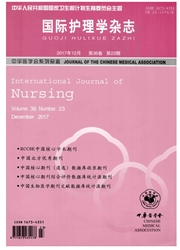

 中文摘要:
中文摘要:
目的探讨前瞻性早期护理干预方法对儿科重症手足口病患儿的管理,从而控制病情恶化的临床效果。方法选取我院2013年1月至2014年12月儿科住院的重症手足口病患儿162例。对照组84例重症手足口病患儿常规抗病毒治疗基础上给予对症支持治疗,及时采取措施并积极防治并发症;实验组78例重症手足口病患儿采用前瞻性早期护理干预方法,即在治疗护理过程中根据病情变化早期观察及标准化护理干预,使危重症状早发现、早控制,阻止其向恶性发展。结果与对照组比较,实施干预措施后,实验组体温下降速度较对照组快,心率、收缩压、惊跳次数均比对照组少,发生皮肤发花人数较对照组少(P均〈0.05)。结论采用前瞻性早期护理干预是提高救治手足口病患儿成功率的关键和重要保障。
 英文摘要:
英文摘要:
Objective To deteriorating conditions of children's explore the clinical effects of prospective early nursing intervention in controlling hand-foot-mouth disease (HFMD) . Methods The hospital mainly researched 162 children which received treatment of hand-foot-mouth disease over the period from January 2013 to December 2014. A total of 84 children with hand-foot-mouth disease was selected as the control group. They were provided with well-tar- geted treatment on basis of conventional anti-virus treatment. The hospital adopted active measures to prevent complica- tions in time. A total of 78 children with hand-foot-mouth disease was as the experimental group. The hospital used pre- liminary forecasting intervention to take case of them. During the treatment and nursing process, the hospital conducted standard nursing intervention according to condition changes and preliminary observations. Early discovery and control of critical conditions can help the hospital to prevent deterioration of the disease. Results After the implementation of the intervention, the temperature, heart rate and systolic blood pressure of the experimental group were lower than those of the control group (P〈0. 05 ) , and the incidence of startle and skin flooding were also lower in the experimental group (P〈0. 05 ) . Conclusions Preliminary forecasting intervention is an important and critical guarantee for us to improve success rate in treating children's hand-foot-mouth disease.
 同期刊论文项目
同期刊论文项目
 同项目期刊论文
同项目期刊论文
 期刊信息
期刊信息
